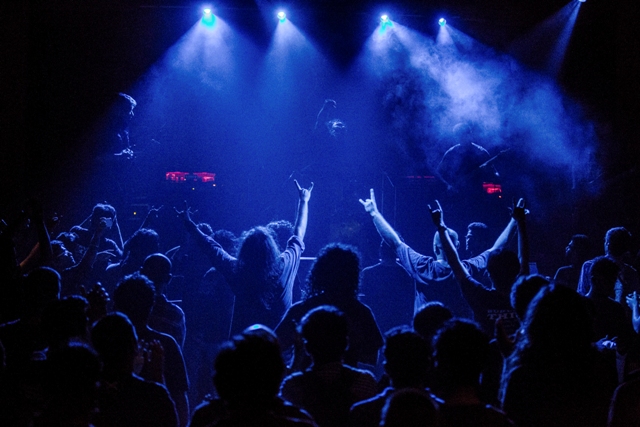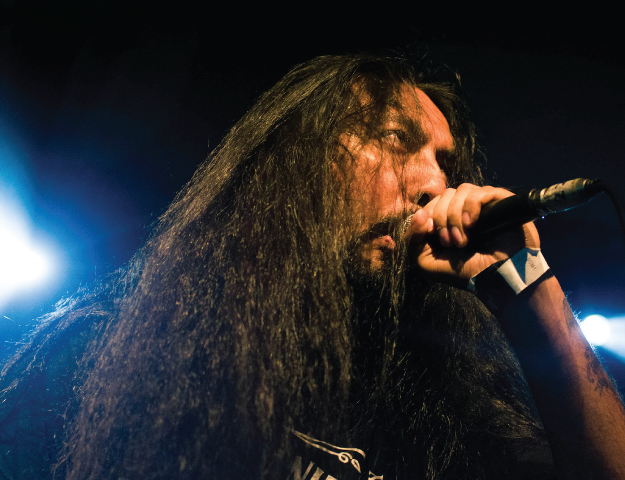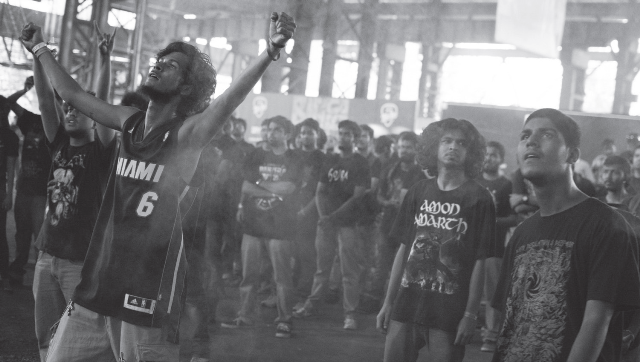Why Indian Metal Gets A Bad Rap
The metal scene is as disorganized as ever. Who is to blame – indifferent venues, free-loading fans or artists themselves?

Metalheads at Rolling Stone Metal Awards 2015. Photo by Prashin Jagger.
Back in 2008, metal acts had a lot going their way, from bands springing up across the country, playing to thousands and even selling albums. There weren’t very many releases yet and notorious gig organizers who’d go AWOL without paying bands. Fast forward to eight years later, and you’d recall an old saying ”“ the more things change, the more they stay the same. Mumbai extreme metallers Demonic Resurrection frontman Sahil Makhija aka Demonstealer says, “All the problems are always money.”
More metal bands have emerged from across the country, but the formal infrastructure is yet to catch up. In between all the social media rants and counter-rants, the looming truth exists ”“ on a formal, organized level, metal music in India hasn’t got very far. Especially when compared to the rising number of bands who play non-metal music, who at least manage to organize a tour every once in a while, regardless of whether they are new or established.
Poor fans, passive venues and elusive sponsors
The idea that metalheads won’t be spending on food and beverage [F&B] is what affects the current model of club venues that host gigs. Online music retailers Bajaao, who organized metal festival BIG69 in January 2015, gained a wave of support for picking up the metal scene in Mumbai from when it had been in flux ever since the closure of metal mainstay venues such as Razzberry Rhinoceros in 2007 and B69 in 2012. Bajaao’s marketing and events manager Himanshu Vaswani says, “At a smaller scale, we don’t need sponsorship, we just need venues. The thing is, venues do shows with so many other genres. If they started treating metal exactly the same, then there would have been no problem.” Apart from young gig organizers giving it a go [gig series such as Thunderstorm and Insurgence have taken place in the past two years] by paying through their own pocket, Vaswani feels organizing metal gigs at a formal level is difficult, especially because it would involve coaxing sponsors. Guwahati-based gig organizer David Koch adds, “Venues get close to no bar sales. They get about Rs 5,000 in bar sales. The metal guys, they don’t eat or drink or anything.”
Nitin Rajan, who hosted one of the city and country’s first metal festivals ”“ Domination:The Deathfest ”“ in 2000, says not much has changed. “The quantum of audience hasn’t really changed. Today, fewer people venture out far and wide, so it’s confusing as an organizer, a band and a fan,” he says.
“Venues get close to no bar sales. They get about Rs 5,000 in bar sales. The metal guys, they don’t eat or drink or anything.”
However, while the emphasis is more on gigs in every other country, Indian metal bands seem to be more confident selling their music and merchandize when the gigs don’t come through. Indian metal record label Transcending Obscurity’s founder Kunal Choksi says, “Shows are on and off, you could say it’s seasonal, it just takes someone to take the initiative. I have people from small towns ordering, in places like Uttaranchal, Aurangabad, Madhya Pradesh and Gujarat. It is getting better, the reach is widening despite everything.”
Metal brings low footfalls
The do-it-yourself ethic continues among metalheads, though, with Pune’s 6th Element Inc kicking off a new metal gig series last month called Reverse Scenario at the 500-800 capacity Classic Rock Coffee Co. Founder Varun Babbar says, “Venues only care about footfalls and what kind of money they’re making off it [a gig].” Babbar seems to have made headway in convincing a big venue to host metal gigs, but it remains to be seen whether self-funded gigs can sustain to provide regular shows for both bands and fans. And business has been tough in Mumbai ”“ with Blue Frog’s once raucous monthly metal nights on a Sunday fading away with a change in programming and even Bajaao’s metal event series Urban Assault fizzling out within a quarter of a year in 2015. Vaswani says, “As a programmer and promoter who sells so many genres, I think metal is easily the toughest one to sell, without a doubt.” Apparently, the only venue taking a chance on metal freely is Delhi’s Antisocial, a performance-only branch of the Social Offline chain of pubs/workspaces.
Musicians to blame too?
Delhi groove/tech metal band Undying Inc.’s bassist Reuben Bhattacharya says that music is becoming a sort of luxury item. He says, “Kids today have the best gear and good music but it doesn’t really filter down to passion on a ground-level. I’ve seen this in Shillong ”“ guys who can outplay anyone who has an [topline guitar effects processor] AxeFX or a seven-string [guitar] because their dad decided to buy it for them. They might work hard on playing but what about those who cannot afford the gear like that?”
As far as his hometown is concerned, he laments that the biggest bands to come out of Delhi play outside the city. “From a city that once hosted [Swedish prog metal band] Meshuggah, that had [rock and metal festival] Great Indian Rock, look at where you are right now. You have nothing to be proud of.” Following the slowdown of Delhi’s top scene catalysts Rock Street Journal ”“ which operated both as a media publication and promoter of events such as Octoberfest and Pub Rock Fest ”“ Bhattacharya says there’s barely been any help. Save for the annual Outrage metal festival In Delhi, Undying Inc. has spent the last two years playing outside Delhi more often. In Delhi, the bassist feels the bands are as much to blame as the audience.
Empty wallets in the North East
In October last year, when Aizawl death metal veterans Third Sovereign announced a nine-city Blood and Roots tour to promote their new album Perversion Swallowing Sanity, they were met with cheers and kudos for taking on a doubly herculean task ”“ first, organizing a multi-city tour and second, getting out of the North East, the region that most metro city organizers won’t touch because of the travel costs involved in bringing them out of any of the Seven Sister states. For a band that has had their studio burn down, their bassist lose his fingers in an accident, bad luck just followed ”“ the Chennai floods late last year caused them to cancel majority of the tour, sticking to just shows in the North East. Says Third Sovereign frontman Vedant Kaushik, “The major problem [for Blood and Roots] was logistics, we had no sponsors. If you approach someone for sponsorship they would straight away ask, ”˜Is it a Bollywood show?’”

Third Sovereign have been battling apathetic sponsors and Bollywood-loving crowd in the North East. Photo by Prashin Jagger.
Despite producing some of the best performers in the country ”“ from Shillong death metallers Plague Throat [who represented India at German metal festival Wacken Open Air in 2014] to Third Sovereign in Aizawl, the passion of the North East’s metalheads doesn’t convert into much of a revenue stream. While Plague Throat got government support to fund their Wacken trip, they’ve spent their early days borrowing gear from friends to practice, perform and record, whereas Third Sovereign stuck it out long enough to earn money from teaching instruments to renting out their Vortex recording studio in Aizawl. Guwahati-based gig organizer David Koch, who founded events company Rocka Rolla in 2008, says he’s hosted about 200-300 metal gigs in Guwahati and he knows why clubs don’t want to host metal gigs. “People in the North East, they hate to buy tickets. They all want free entry. They hate to pay.”
Metals needs moneyed fans
The trend in Bengaluru is perhaps a good example of what the country needs ”“ an older, moneyed crowd ready to shell out ticket prices ranging from Rs 300 to catch local bands to Rs 2,000 to catch extreme underground metal. Old-school metal bands such as Kryptos and underground metal still reigns in Bengaluru ”“ arguably the hub of international metal in India with past and current festivals such as Deccan Rock, Rock ”˜N India, CultFest and Bangalore Open Air.
Unlike other cities, Bengaluru’s best-known venues such as The Humming Tree, BFlat and Indigo Live Music Bar have all been hosting metal gigs without any hitches, only depending on promoters and other gig organizers to rent out the venue for shows rather than in-house programming of metal bands. The erstwhile venue CounterCulture, which closed last year and changed management, was the only one to host a specific event called Metal Factory every month for four months between 2013 and 2014. Says Guru Somayaji, head of programming and production, “The five Metal Factory shows were all successful. The model with Metal Factory was pretty much up the gate fare and distribute it among the artists. We were getting outstation artists and if we knew the night was doing well, we were taking care of the flights and distributing the fee among the artists.” So successful was Metal Factory that CounterCulture hosted a metal New Year’s Eve gig in 2013. Somayaji recalls, “In my life, I never thought it would be as successful as it was.”
If you approach someone for sponsorship they would straight away ask, ”˜Is it a Bollywood show?’”
Event organizing firm Sound Awake, which was co-founded by Bengaluru-based Sangeeth Ram in 2013, has been giving the city a regular dose of metal with shows such as Insurrection. Ram says it’s been tough doing shows with their own company funds when sponsors become difficult to convince. He says, “Most of the shows don’t work out for us financially, but when we put a show out there, it might just be to make a musician or a fan happy.” The talent is definitely out there, but as Somayaji also says, “They’re yet to get the economic balance right.” Ram adds that even one sponsor for each metal gig can change the game. “The marketing guys at big brands need to start listening to some good Indian music,” he says.
Meanwhile, Chennai continues to ebb and flow with organizers such as Unseen Underground disappearing and reappearing every now and then, while the Raw Power gig series were going strong until the Chennai Floods late last year put their finances in the red over the canceled Blood and Roots South Indian leg. Hyderabad, on the other hand, has had Hard Rock Café hosting Metal Mania with Bajaao every month. Vaswani says this is because they have ascertained the following for metal. He adds, “Everyone [club venues] wants to do something different. It’s a good experiment for Hard Rock, in my opinion. It’s also about the willingness of the venue to change.
Writing the future
Bands such as Bhopal’s up-and-coming death metallers Elemental and Mumbai’s Providence have different ideas about what it can take to keep metal alive. The band’s frontman Anchal Bhargava feels more bands should write and even sing in an Indian context, just like they’re taking to Sanskrit and setting death metal to the Bhopal Gas Tragedy of 1984. Providence guitarist Shezan Shaikh says struggle has always been in metal’s legacy. “Heavy metal has been around way longer than this. Self-supported, self-sustained, totally independent,” he says.

Organizers admit that metal is the toughest genre to sell; fans at BIG69 Festival, Mumbai 2015. Photo by Prashin Jagger.
From the gig organizers, there’s persistence in store. Says Vaswani, “Any time anyone has tried to crack a niche, it was never easy. From a business point of view, whenever someone says it cannot be done ”“ I’m only saying it’s hard ”“ it’s not impossible.” With more and more bands such as DR, Gutslit, Kryptos and Skyharbor saving up enough to head out for international tours on an annual basis, Indian metal bands are looking at the larger picture as well. Kryptos frontman Nolan Lewis says, “I think Indian bands need to step out of their comfort zone…. they need to get out to see what it’s actually like to be a touring band, you know? How much hard work goes into it.”
But until then, organizers such as Somayaji are certain that metal will have its day in the sun soon. He says, “In the next five years we’ll have one or two really massive scale metal shows. There is an audience for it.”
This article appeared the February issue of ROLLING STONE INDIA. Additional reporting by Nabeela Shaikh.



